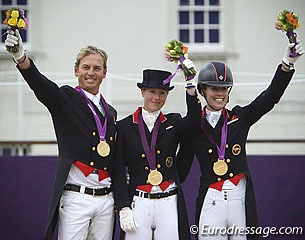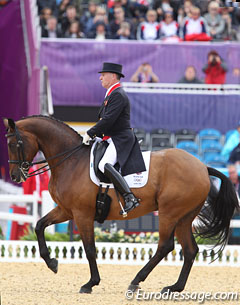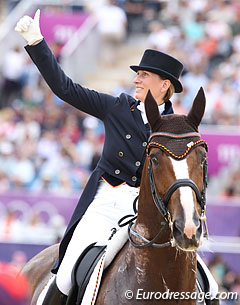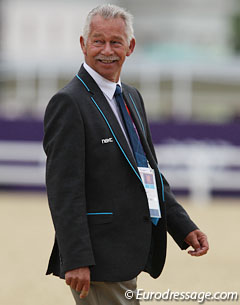
Every rider, judge, owner, groom, or ground person say the dressage and the organization surrounding the 2012 Olympic Games in London, was nothing short of spectacular. However riders noted that some aspects of the new Olympic format were more beneficial than others.
The major changes to the Olympic format included
1) The team medals decided by the combined scores of the Grand Prix and Grand Prix Special.
2) The top 18 horse-and-rider combinations, and those tied for 18th place then qualified for the Freestyle Final, which was a stand-alone competition from which the individual Olympic champion emerged.
3) The Grand Prix was run over two days, Thursday 2 and Friday 3 August, and the top seven of the 10 competing nations qualified for the Grand Prix Special team medal-decider.
4) The nations teams were made up of just three riders (already reduced from the typical format of four riders in 2008) with no discard score.
5) The riders were no longer allowed a full lap around the arena before entering, and had just 20 seconds to get their horse in the gate.
6) The timing of the tests was reduced to allow just 9 minutes for the Grand Prix and 9 minutes for the Grand Prix Special.
Eurodressage checked for reactions from the riders about this new Olympic format, which raised quite a lot of scrutiny after the event. The IDRC will discussing the format at their annual General Assembly held at the 2012 Global Dressage Forum at the end of October 2012.
"I think it is not a bad idea to use both the Grand Prix and the Special to determine the team medals, as it makes it that bit more exciting," said Swedish team rider Patrik Kittel.
However the majority of riders believe that there was too much time in between the events, which certainly took away from the momentum of the competition.
 "There were way too many days' break that took away some of the excitement for me," Kittel added. Patrik said that dividing the team for the special "is also not a very smart thing to do," believing that the teams should be starting the same as in the GP. “Riders should start in the same order they are in after those that did not qualify for the special are taken out. This also means the individual riders don't have to start in the first groups, which makes it a little more open."
"There were way too many days' break that took away some of the excitement for me," Kittel added. Patrik said that dividing the team for the special "is also not a very smart thing to do," believing that the teams should be starting the same as in the GP. “Riders should start in the same order they are in after those that did not qualify for the special are taken out. This also means the individual riders don't have to start in the first groups, which makes it a little more open."
Australian dressage rider Lyndal Oatley agrees with her husband that while the new format "made for an interesting competition." She did not like the way the teams where placed to compete in the Special.
"Having the teams grouped in the way they were for the Special is disadvantageous for the stronger riders in the less strong teams, as they compete too early in the competition. I think this was enforced to make the sport more entertaining from a media perspective and while I agree it is a little frustrating having riders placed below you go through to the next round, for the sport I think this is a better arrangement."
Dutch Olympian Anky Van Grunsven also agrees that both scores should count towards the team total, as it presents the judges with more of what the horse and rider can do.
“It’s more fair when both results do count, instead of only the Grand Prix. You have twice as many moments you can see the competitors and their horses, so twice as much results as well that will count for the medals,” Anky stated. “I think it was introduced to make the competition more fair and to make the Grand Prix Special more important.”
British team member Richard Davidson says he thought the London Games were "totally great".
"I know some will say I'm a Brit and biased, but having been to five Olympics either as an athlete or Team Manager, I thought these were outstanding."
As a member of the FEI Dressage Task Force Richard was actually part of the panel who recommended some of the new aspects of this year's format and says the reason the GPS was introduced for the final of the team competition was to create a more exciting finale for spectators and the media.
 "The GP takes two days and expecting non-equestrian journalists, or even borderline equestrian spectators, to sit through and follow a class of that duration is unrealistic. The new format brought the competition to a clear climax and I thought it worked very well. I am interested to learn the views of a cross section of spectators and journalists as to how it worked for them. From a riders view I think it also allowed us to demonstrate the consistency of our horses over two tests and not just one, which is positive."
"The GP takes two days and expecting non-equestrian journalists, or even borderline equestrian spectators, to sit through and follow a class of that duration is unrealistic. The new format brought the competition to a clear climax and I thought it worked very well. I am interested to learn the views of a cross section of spectators and journalists as to how it worked for them. From a riders view I think it also allowed us to demonstrate the consistency of our horses over two tests and not just one, which is positive."
Davison also believes it is interesting, "in fact essential," to ask FEI Dressage score analyst David Stickland to work through the scores and see what different results various options might have achieved. "For example, I would like to see what would have changed if the GPS would also have been combined with the Kur to determine the individual rankings of say the silver and bronze medal contenders," Davison wondered.
While many agree with the combined team scores, German rider Anabel Balkenhol "did not like that so much".
"In my opinion the Grand Prix should count for the Team medal and the GPS and the freestyle should count for the individual medal," Balkenhol stated. "Because for sure, in my opinion, there should be one classical test that counts for the individual medal as well. It is absolutely important that the classical part be stronger for determining the individual medal than the artistic part, meaning the freestyle. So in my opinion both tests have to count for an individual medal."
In addition Anabel feels unsure as to why the changes were introduced and feels that riders are often left wondering about a lot of things.
"I did not received any information about why the changes were introduced.
The information flow about changing things is very bad. I have no idea why they did it that way."
 Anabel agreed "there was too much time between the GP and the GPS". Anky added the break takes away from the momentum of the competition and does not think it isn’t necessary.
Anabel agreed "there was too much time between the GP and the GPS". Anky added the break takes away from the momentum of the competition and does not think it isn’t necessary.
“For the riders it’s actually quite comfortable; after the Grand Prix they have a couple of days to prepare their horses and themselves for the Grand Prix Special and after the Special they can prepare for the Kür," Van Grunsven mentioned. "I think for the supporters though, the competition in general takes too long with the format as it was in London.”
Richard added that while he understands the principle behind it (ensuring that all riders have the same time and keeping the competition flowing), he believes “it is not logical that in every other competition it is an accepted part of horse familiarization and part of ensuring that horses and riders are provided with reasonable chances to show their optimum performance, and yet, in the biggest and most challenging stadium in the world, this is denied”.“I watched the eventing horses doing their dressage and being given ample time to settle down before the judge rang the bell, which is good horse-friendly practice. The lack of time before entering the arena definitely did not help for some horses, especially in the GPS, where they met banks of cameras from the worldwide media that they would never have experienced before."
Emphasizing the years of training that goes into an Olympic debut, Patrik added that "it was really stupid that the first day you had to almost trot out and go straight in. Not even allowed to ride one lap around the arena? Come on, It´s the Olympic Games! Give riders a chance to go one time round, so the horse can see something, and please let the rider walk out and have time to say hi to everyone. All the riders work so hard to get there, those 20 seconds more should be included!"
Anabel remembered that it was "really a bit hectic for all of us", and believes the full lap "would have made a big difference for all riders", giving their horses "the chance to settle just that bit more".
“Of course it makes a difference whether or not you are allowed to ride around the arena before the test starts,” said Anky. “The more time you get, the easier it will be in the arena. It allows the horses to get used to strange objects, like cameras and microphones. If we are no longer allowed to ride around the arena, it will be more difficult in the test, because the horses will see everything for the first time from inside the arena, when the test has already begun.”
Delighted to say that the London Olympics were the most fantastic competition he has ever attended, president of the judges ground jury, Stephen Clarke, "applauds" the new format and indeed the entire Games experience.
"The level and quality of the performances and the organization was simply outstanding, certainly higher generally than has ever been witnessed before," Clarke said. "Having both the Grand Prix and the Grand Prix Special count for the Team competition, I felt, provided a realistic picture of the best trained horses which performed with the most consistency, rather than finding the result from those that either had a good or a bad day in the Grand Prix only. However, I did not feel that it was satisfactory to find the Individual medallists from the result of the Kur only, even though they had to qualify through the Grand Prix and then the Special. To my mind the medal deciding factor for the Individuals from the Kur alone turned it more or less into a World Cup competition, rather than finding the medallists from the most consistent athletes with all scores counting from all three competitions."
Clarke reminded that the old format for determining the individual Olympic champion worked well in the past. "I believe that there is some IOC ruling that makes this impossible, but if memory serves me correctly the Individual medals in Athens were decided from the accumulation of scores from all three competitions."
 Having experienced many different Olympic formats, Anky says it is different at every Games. “It never is the same, but in my opinion, if both results count for the team medal, they both should count for the freestyle as well. I think it makes it more fair when both results count instead of just one.”
Having experienced many different Olympic formats, Anky says it is different at every Games. “It never is the same, but in my opinion, if both results count for the team medal, they both should count for the freestyle as well. I think it makes it more fair when both results count instead of just one.”
Another controversial change was the "three to a team" concept, introduced back in 2008 to increase the number of nations being represented.
"I fully understand that the ‘Three on a team’ concept, with all three scores counting for the team score, gives greater opportunities for more nations to take part in the Games, which has to be right when you consider the spirit of the Olympic Games. Also it certainly brings with it some ‘breath holding’ excitement, when you consider that if any misfortune befalls one member then the whole team is out! As sadly happened to the poor Canadians,” said Stephen Clarke.
Stephen highlights a very important point, asking us to consider what would have been the reaction had this happened to one of the potential medal teams?
“For now I can accept this concept, on the basis that dressage is only allowed a maximum of fifty horses by the IOC, but when you consider the popularity of the sport I really hope that a way can be found in the future to increase the number of starters, and allow once again the old format of four on a team with the best three to count without closing the door on the number of starters from the rapidly developing dressage nations."
Patrik Kittel highlighted a different aspect to the three in a team concept, in that perhaps the role of the individual rider can also be overlooked.
"It has to be changed so that the individual rider is in the team or made the reserve!!
I would find it hard if my team mates got a medal and I just stood there. Small things will for sure change, and for the better!"
Anabel prefers the option of going back to four riders in the team as well, so that the team can have a scratch score. "You could see that all individual riders in London got scored lower than they deserved.
The danger that these riders are becoming the role of statistics is very big," said Anabel.
As for the changes to the timing of the tests, nine minutes in Grand Prix and Grand Prix Special, Stephen Clarke felt it worked for the Grand Prix, but created a rather rushed atmosphere for all concerned in the Special.
 "The new Special, which was devised with the Olympics in mind, turned out to be not quite as short as some imagined, and it was thanks to the brilliant Organization, Technical Delegate and wonderful Stewards, as well as the co-operation from the riders that the competition was kept to time, which was vital from the point of view of TV coverage. I always feel that the job of the commentator is underestimated, that he managed to give out the scores and introduce the next horse and rider without sounding breathless was admirable indeed! Yet still I heard from some spectators that they were disappointed that the scores remained on the scoreboard for such a short time."
"The new Special, which was devised with the Olympics in mind, turned out to be not quite as short as some imagined, and it was thanks to the brilliant Organization, Technical Delegate and wonderful Stewards, as well as the co-operation from the riders that the competition was kept to time, which was vital from the point of view of TV coverage. I always feel that the job of the commentator is underestimated, that he managed to give out the scores and introduce the next horse and rider without sounding breathless was admirable indeed! Yet still I heard from some spectators that they were disappointed that the scores remained on the scoreboard for such a short time."
Clarke hopes that the FEI Dressage Committee will decide to return back to the old Grand Prix Special. "While the new Grand Prix Special test did its job, my wish for the future would be that the old Grand Prix Special with its classical symmetry is reinstated and that if possible planning is made for the time per test to be increased to nine and a half or even ten minutes. This said, we do have to accept that television and media coverage are crucial for our sport and that every effort has to be made to understand and co-operate with their time limits."
The huge gap of time between the Grand Prix and Special might have been less favourable, but Clarke said the logistics of staging equestrian Olympics are complex enough as it is. "Whilst I’m sure that the majority of the riders felt that having a three day gap in-between the Grand Prix and Special took something away from the momentum of the competition, we all have to accept that with the show jumping competition being staged within the same time period, this must have created a logistical nightmare for the organizers who did everything possible for the benefit of the riders and the welfare of the horses."
Clarke believes the popularity of dressage has increased after the London Olympics. "After London I was left with a feeling of great pride for our sport which over the years has gained more and more momentum and popularity.
Hopefully dressage is now in a strong enough position to expect a more level playing field in relation to the other equestrian disciplines."
All in all, every rider agrees that the Games were an absolute success and those involved in the introduction of the new format are certain that it will be fully analyzed and reflected upon, to create an even brighter dressage future.
"I am sure all theses aspects will be scrutinized in the post-Games review due to be conducted by the FEI. It is important that our sport continues to look at itself from all angles, and recognize the importance of continuous development. There are many stakeholder aspects to consider when it comes to getting the right formulae," Davison concluded.
by Sarah Warne
Photos © Astrid Appels
Related Links
David Stickland: Olympic Dressage Score Analysis
2012 Olympic Games - Table of Contents